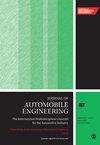Proposing a new control method for active stabilizer bars using an intelligent self-learning algorithm
IF 1.5
4区 工程技术
Q3 ENGINEERING, MECHANICAL
Proceedings of the Institution of Mechanical Engineers Part D-Journal of Automobile Engineering
Pub Date : 2024-05-11
DOI:10.1177/09544070241247992
引用次数: 0
Abstract
This article’s main content is directed toward designing and applying a new control algorithm for automotive stabilizer bars. Previous studies often only used classical control algorithms or simple fuzzy algorithms to control hydraulic anti-roll systems on cars based on safety criteria. In this article, a self-learning algorithm (ANFIS) is established based on inheriting the advantages of previous algorithms. Additionally, this algorithm is modified and improved to increase the convergence of the results after the end of the steering process. Simulations show that when the self-learning solution is applied to active anti-roll bars, the roll angle value and the attenuation of the vertical force at wheels decrease significantly. In complex motion conditions (second case, v利用智能自学习算法为主动稳定杆提出一种新的控制方法
本文的主要内容是针对汽车稳定杆设计和应用一种新的控制算法。以往的研究通常只使用经典控制算法或简单的模糊算法,根据安全标准控制汽车液压防倾系统。本文在继承以往算法优点的基础上,建立了一种自学习算法(ANFIS)。此外,还对该算法进行了修改和改进,以提高转向过程结束后结果的收敛性。仿真结果表明,当自学习方案应用于主动防倾杆时,滚动角值和车轮垂直力衰减明显减小。在复杂运动条件下(第二种情况,v3),如果汽车没有防倾杆,就会发生侧翻。然而,在应用 ANFIS 算法控制主动防倾杆时,侧倾稳定性和路面保持能力始终得到保证。根据这些发现,即使汽车在极其恶劣的条件下行驶(第二种情况,v4),后轮垂直力的最小值也可达 1384.02 N。此外,当智能自学习算法应用于防倾杆控制系统时,响应速度和数值收敛性始终得到很好的控制。
本文章由计算机程序翻译,如有差异,请以英文原文为准。
求助全文
约1分钟内获得全文
求助全文
来源期刊

CiteScore
4.40
自引率
17.60%
发文量
263
审稿时长
3.5 months
期刊介绍:
The Journal of Automobile Engineering is an established, high quality multi-disciplinary journal which publishes the very best peer-reviewed science and engineering in the field.
 求助内容:
求助内容: 应助结果提醒方式:
应助结果提醒方式:


